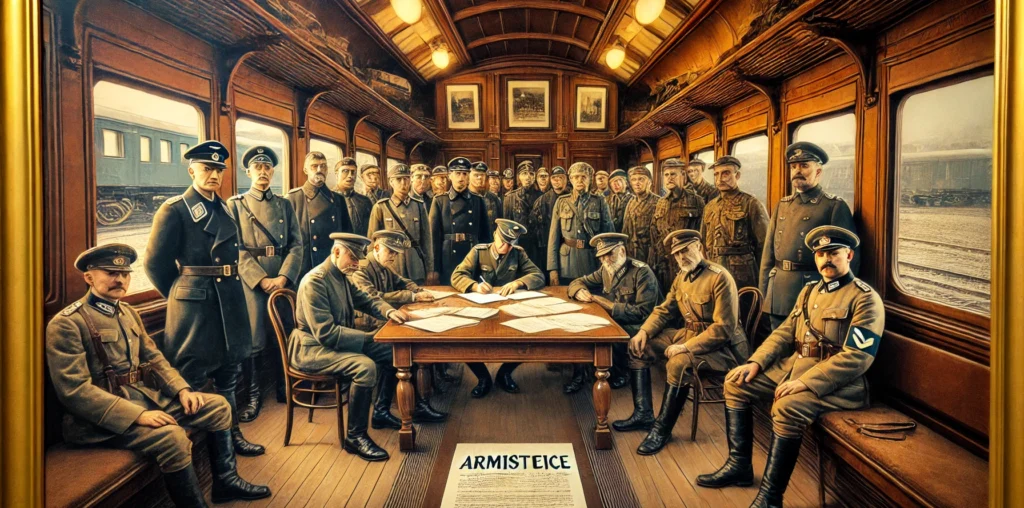Background: World War I, also known as the Great War, lasted from 1914 to 1918 and involved many of the world’s leading powers. It led to massive casualties, economic hardship, and social upheaval across Europe and beyond.
What Happened: On November 11, 1918, at 11 AM, an armistice was signed between the Allied powers and Germany, marking the end of fighting on the Western Front. The signing took place in a railway carriage in the Compiègne Forest, north of Paris, and symbolized the culmination of prolonged negotiations. The terms of the armistice had been dictated by the Allied commanders and required Germany to evacuate all occupied territories, withdraw beyond the Rhine River, and surrender its weapons, including heavy artillery, aircraft, and ships. For Germany, it meant the end of four years of warfare, mass casualties, and economic collapse. Soldiers in the trenches, who had endured brutal conditions, learned about the armistice from hastily distributed messages and signals. Many found it hard to believe that the war was finally over, given the years of relentless bombardment and the seeming endlessness of the fighting.
As the news spread, spontaneous celebrations erupted in Allied countries. In cities like London, Paris, and New York, people poured into the streets to celebrate the end of the conflict. The mood was a mix of jubilation and relief, tinged with sorrow for the millions of lives lost. German forces, meanwhile, faced a different kind of reality. The German population had been led to believe that their armies were still capable of achieving victory, and the news of the armistice and subsequent defeat came as a shock. This led to widespread discontent and political instability in Germany, contributing to the abdication of Kaiser Wilhelm II and the establishment of the Weimar Republic.
The armistice was a temporary truce meant to last 36 days, but it was extended several times until the signing of the Treaty of Versailles in June 1919, which formally ended the war. Though the guns fell silent, the peace negotiations that followed were filled with tension and controversy. Many of the Allied nations sought to impose harsh terms on Germany, holding it responsible for the war and demanding reparations. The war had taken a devastating toll, with an estimated 8.5 million military deaths and over 21 million wounded, not to mention the countless civilian casualties and destruction of infrastructure.
Impact for the Future: The armistice brought an end to a devastating war that reshaped the global order. It laid the groundwork for the Treaty of Versailles, which imposed heavy reparations on Germany and set the stage for political unrest, ultimately contributing to the rise of Adolf Hitler and World War II. Armistice Day became a day of remembrance for those who served and sacrificed during the war, evolving into Veterans Day in the U.S. and Remembrance Day in Commonwealth countries.

